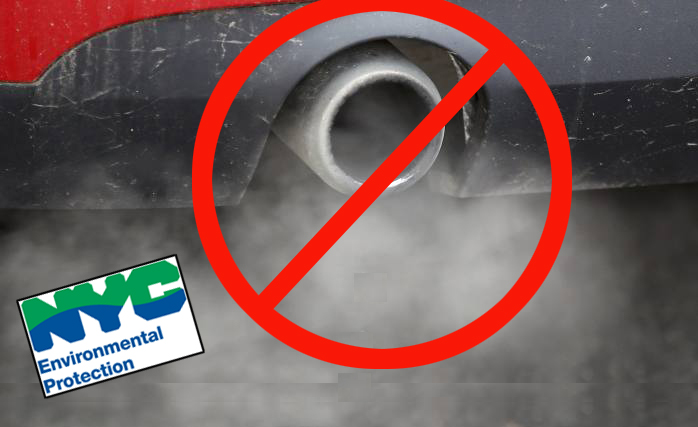No pollution for you!
The city Department of Environmental Protection changed its mind about giving a free pass to several repeat offenders of city anti-idling law, quietly revealing on Friday that it had turned down requests from three companies to stop being ticketed for polluting city air.
The three would-be polluters — Osmose Utilities Services, Loomis Armored US and Spectrum — were all notified on Thursday by DEP. All three letters refer to city rules stating that DEP can only grant a variance if a company shows that complying with the law causes “unreasonable hardship."
"Unreasonable hardship has not been adequately shown," concluded Mark Page, the acting director of the agency's
Bureau of Environmental Compliance, using more or less the same language in his letters. Page concluded that all three exceptionally well-off companies could simply acquire additional equipment to power its machines in the field rather than simply defaulting to the power generated by an idling internal combustion engine.
Page's letters came after intense scrutiny of the process by Streetsblog, which first revealed the city's plans for the variances, and published an op-ed from a pediatrician about the danger of the proposal.
The department's denials cheered the small cohort of New Yorkers that has taken upon itself the Sisyphean task of reporting idling vehicles to the DEP (in exchange for a small portion of the summons fee).
"These requests used to be rubber-stamped," said Eric Eisenberg. "These are the first times DEP has ever denied an idling variance request, so this represents a somewhat monumental development."
Eisenberg attributed the agency's rejection to a combination of complaints from activists, plus letters from Manhattan Community Board 4 and state Sen. Brad Hoylman that "helped scare the DEP into realizing it needs to be serious about idling and environmental protection."
Patrick Schnell, the pediatrician, expressed surprise at the victory.
"Honestly, after all these years of seeing DEP encourage and protect idlers, I am a bit shocked," he said. "Clearly, those companies did not have any valid arguments to support their requests for variances, but that did not keep DEP from granting variances in the past. This is certainly great news for New Yorkers."
After initial publication of this story, DEP’s Deputy Commissioner for Sustainability Angela Licata sent over a statement about her agency's refusal to grant the variances:
"Idling vehicles harm air quality and are a threat to public health, which is why we are demanding that the best available technologies are utililized to power these commercial vehicles," she said.
These three variances aside, activists and all New Yorkers who breathe, are now awaiting the fate of a larger change that has been proposed by DEP that would tweak the language of existing regulations. Currently, a company can argue that its vehicles must remain on so that workers can perform the essential tasks, and the city is considering broadening the definition of what types of "processing devices" meet that threshold.
That proposal has also come under fire, but there's reason to believe that the language change will meet the same fate as the three companies' variances. After Streetsblog's initial coverage of the variance hearing earlier this month, a spokesman for the DEP said, "Due to some persuasive comments received during the public hearing, we are considering some tweaks to the proposed new language."






